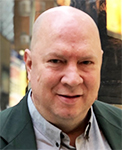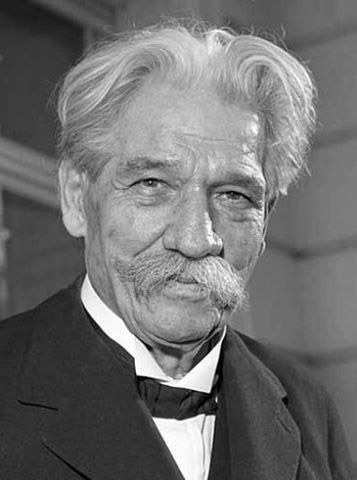The Volunteer Who Found Albert Schweitzer in Gabon — Eric Madeen (Gabon)
The materials for this Profile were drawn largely from an article in Peace Corps Worldwide by Eric Madeen in which he recalled tracking down Dr. Albert Schweitzer at his hospital in Gabon.
by Jeremiah Norris (Colombia 1963-65)

Eric Madeen (Gabon 1981-83)
In 1981, Eric Madeen joined some 60 other would-be Peace Corps Volunteers in Gabon for training in TEFL, fisheries, agriculture and construction projects. During a stretch of French language training, he made several trips to the nearby Schweitzer Hospital to gather information about its founder for an article to be published in his home town newspaper. He gave the subsequent article to a friend who was leaving the country, but alas, it didn’t make it home and he has since regretted not posting it properly himself.
Eric’s PC training took place at a high school in Gabon’s capital of Lambarene that was located atop a hill. After French classes on Saturdays, Eric made a habit of gathering his backpack of notebooks and camera for a hike up to the Schweitzer Hospital. A Gabonese gardener was kind enough to lead him to the head nurse of the deceased doctor. After introducing himself, she crossed her arms and an origami creased her visage. Annoyed, she explained that yes, she was the head nurse, but “no, absolutely no more talking with journalists.” She repeated this and said she had been misquoted too many times amidst much bad reporting. Steadfast, Eric challenged her, saying “Because one nail is bent does that mean that all nails are bent?” She registered this with a headshake which left Eric standing there.
Later, after Eric had hung around for a month of Saturdays, he seemed to have passed some sort of a ‘smell’ test with upper echelons of hospital staff. Perhaps, the head nurse had gotten word that Eric was not a bent nail. By poking around, Eric found signs which indicated the location of the good doctor’s elongated, planked office and bedroom. Eric took note of the doctor’s writings in notebooks and published hardbacks opened on shelving and in glass cases. The doctor did his correspondence at a modest wooden desk and chair. Notable in the office was Dr. Schweitzer’s famous pith helmet.
Eric was introduced to one of the two surviving hires from Europe who were still laboring on after Dr. Schweitzer’s death in 1965. With good grace, one of them, Maria Lagendijk, the last European to have worked with Dr. Schweitzer, seated Eric in a chair. She then explained how she came to the hospital from Holland, some four decades ago, to what was once called French Equatorial Africa, with graduate training as a nurse specializing in intensive care, pharmacology, anesthesia, and midwifery.

Albert Schweitzer, 1955
Maria then pointed to the dark red corrugated iron roof overhead, commenting that Dr. Schweitzer invested his Nobel Prize winnings in metal roofs for the hospital and for the adjacent leper colony, called the Village of Light. She recalled an interview with Dr. Schweitzer in the old country. She said that he always asked his foreign staff these penetrating questions: 1) Do you have a sense of humor; 2) How do you sleep at night; and 3) What are your hobbies? Going on, she related how a tangle of weeds covers the vegetable garden where Dr. Schweitzer struggled to duplicate — almost on the Equator, the gardens of his birthplace in Europe. Maria exclaimed “he grew tomatoes as big as this she recalled,” forming a giant fruit outline with her hands.
Eric found that a new operating theater was air-conditioned. And that the autocratic rule of that highly individualistic genius was an institutionalized administration with fiscal support from foreign donors and the government of Gabon. The good Dr.’s skepticism about the competence of Africans to be medical doctors had been replaced by an open door to Gabonese doctors, although few were coming. The sometimes-primitive medicine that he practiced had been modernized, with special studies for Western medical students and a new research program was coordinated with three European tropical medicine centers. And transport was now by air or road, no longer by the river boats that first brought the Schweitzers to Gabon. But each patient’s family still cooked individually for the sick and provided bed-side care. Old wards had been converted to care for the elderly and homeless, services rare for West Africa.
And out beyond the main hospital’s facilities, a treatment center for lepers continued Dr. Schweitzer’s pioneering work. Eric noted that progress comes slowly: life expectancy was still only 49 years. Life in the bush had hardly been touched by Gabon’s petroleum wealth. Maria introduced Eric to an American intern doing his residency at the hospital. He told Eric how the hospital used pairs of Harvard interns for six months a year, and two other Swiss interns for the other six. The American intern commented that due to the high number of patients with varying degrees of maladies and understaffing, he went from not only being the head intern to head almost everything: head surgeon, head ob-gyn, head of infectious diseases, etc.
Eric concluded his experiences at Dr. Schweitzer’s hospital by commenting that he was a man of much erudition, having studied theology and philosophy at the universities of Strasbourg, Paris, and Berlin, earning fame as an original and powerful theologian, then philosopher, organist, musicologist, and at age 38 becoming a Medical Doctor. Along with his wife, the two of them decided to serve humanity in the missionary hospital they founded— largely funded by their giving organ recitals in Europe.
Since Eric has used some of his time as a Volunteer to reintroduce Dr. Albert Schweitzer to a contemporaneous audience, he is well-deserving of a Profile in Citizenship.
•
Photo of Dr. Schweitzer by By Bundesarchiv, Bild 145 Bild-00014770 / CC-BY-SA, CC BY-SA 3.0 de, https://commons.wikimedia.org/w/index.php?curid=20488725
Thank you so much, Jeremiah, for the succinct summary of my article. I just found it now and my apologies for the late response. By the way, did I ever get a Profile in Citizenship? Anyway, I am honored that you put my name forward. Much appreciated! Eric Madeen/Yokohama